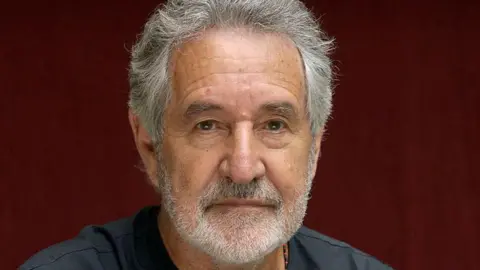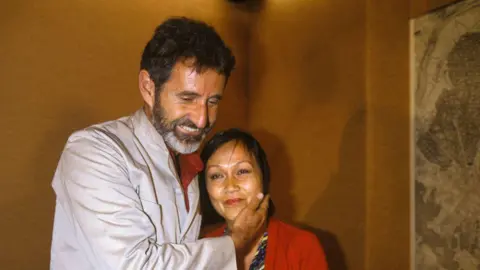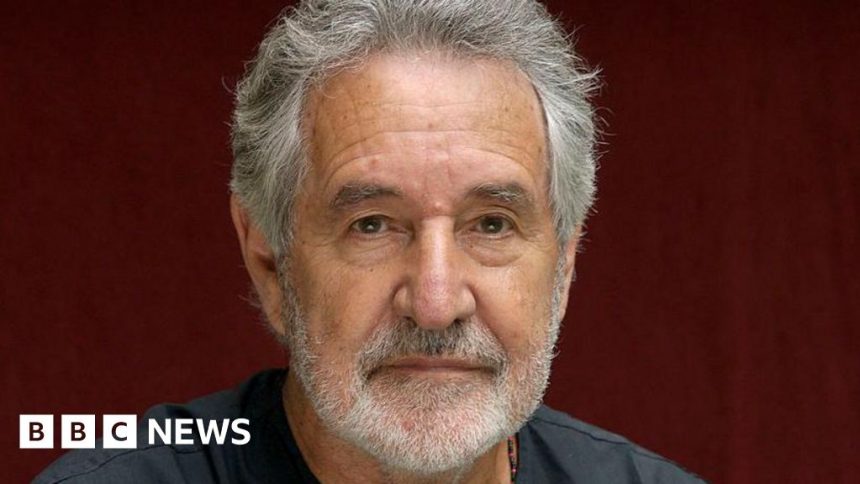South African anti-apartheid writer Breytenbach dies
 Getty Images
Getty ImagesThe renowned anti-apartheid writer and activist Breyten Breytenbach, jailed for his beliefs in South Africa in the 1970s, has died aged 85, his family said.
He passed away in his sleep, with his wife Yolande by his side in Paris.
The dissident poet, novelist and painter was “an immense artist, militant against apartheid, he fought for a better world until the end,” a statement from his family read.
Breytenbach’s sharp intellect earned him widespread admiration, prompting the British satirical television puppet show Spitting Image to describe him as “the only nice South African” in a song during apartheid’s darkest days.
Jack Lang, French former education minister, shared a heartfelt tribute on X.
“A rebel with a tender heart, he was part of all the struggles for human rights,” he wrote.
Born in the Western Cape on 16 September 1939, to a family of five, Breytenbach lived much of his life abroad, but always remained true to his South African roots.
He attended the University of Cape Town and joined a group of Afrikaans poets and writers called the Sestigers, who wanted to highlight the beauty of the language while critiquing the racist apartheid regime.
Afrikaans evolved among white settlers and comes from the Dutch word for African.
With Afrikaners in power during apartheid, the language became ever more associated with the oppressive regime.
In an interview with The New York Times, he said: “I’d never reject Afrikaans as a language, but I reject it as part of the Afrikaner political identity. I no longer consider myself an Afrikaner.”
In 1960 he left South Africa for a self-imposed exile, mostly in Europe, but he continued to be a vocal critic of the apartheid regime.
He worked in London for a while before settling in France, where he met his Vietnamese wife Yolande Ngo Thi Hoang Lien.
Breytenbach tried to return to South Africa with his wife in the 1960s, but she was denied a visa because she was a “non-white”. Interracial marriages were against the law.
 Getty Images
Getty ImagesIn 1975, at the height of his literary fame, he made a clandestine return to South Africa, where he was arrested for attempting to aid resistance groups in the country.
He was sentenced to seven years in prison for terrorism, but continued to write poetry while he was jailed.
The then French President, François Mitterrand, helped secure his release in 1982 and he became a French citizen.
The years of imprisonment resulted in one of his most impactful works, his novel The True Confessions of an Albino Terrorist – a harrowing account of his seven-year prison sentence, two of which he spent in solitary confinement.
After apartheid ended, he became a vocal critic of the liberation government of Nelson Mandela. He felt the African National Congress (ANC) had turned into a “corrupt organisation”.
The poet didn’t only use his pen to fight those injustices in South Africa, but also around the world.
In 2002, he wrote an open letter in The Guardian to the then Prime Minister of Israel, Ariel Sharon.
“Why should we look the other way when it is Israel committing crimes? A viable state cannot be built on the expulsion of another people who have as much claim to that territory as you have,” he wrote about the ongoing conflict between Israel and the Palestinians.
Breytenbach published over 50 books during his lifetime, and some have been translated into multiple languages.
He is also known for his surreal paintings, which often depict humans and animals in captivity.
He was later made a Knight of the Order of Arts and Letters, France’s top cultural award.
Breytenbach is survived by his wife, Yolande, and daughter Daphnée and two grandsons.
You may also be interested in:
 Getty Images/BBC
Getty Images/BBCGo to BBCAfrica.com for more news from the African continent.
Follow us on Twitter @BBCAfrica, on Facebook at BBC Africa or on Instagram at bbcafrica







